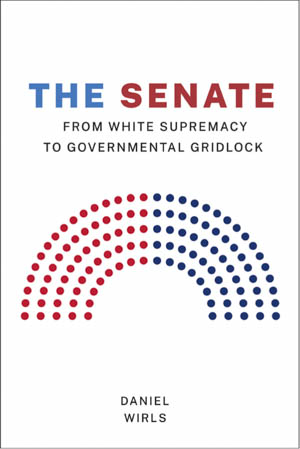In his new book, Professor of Politics Daniel Wirls calls for reform of the United States Senate by arguing that features like the filibuster and equal representation among states undermine effective democratic governance and have contributed to the maintenance of white supremacy.
In The Senate: From White Supremacy to Governmental Gridlock, Wirls supports these views with extensive historical research and modern-day observation and analysis. The book includes a study of records from the U.S Constitutional Convention and proceedings from all major Senate debates about the filibuster, dating back to before 1917. Wirls also includes insights from interviews with Senate staff across the past decade.
“The weight of history should really push us to think about why some of these institutions should be changed,” Wirls said.
In particular, the book focuses on two key aspects of the Senate that Wirls believes violate the democratic tenet of “one person, one vote” by promoting minority rule. First, a minority of the voting population in the United States can dictate what happens in the Senate, he says, because each state, regardless of population, is allotted two senators. Wirls sees this as a form of relative disenfranchisement for voters in more populous states, which also tend to be more diverse.
Secondly, Wirls says the minority of elected officials within the Senate can block what the majority wants to do through the filibuster: a type of prolonged debate used to stall or prevent voting on a topic. Wirls argues that the filibuster has become a problem for the entire government, because a minority of senators determined to prevent passage of legislation can ultimately block the policy agendas of both the majority in the House of Representatives and the president.
“We find ourselves in a situation where the filibuster is becoming increasingly dysfunctional, and equal representation among states, more than any time in American history, is giving an advantage to one party over the other,” Wirls said. “Regardless of which party that benefits, it’s not a democratic process.”
The book unpacks many common defenses of these aspects of the Senate, which Wirls argues essentially amount to a “mythology” with no strong constitutional foundation. For example, the Senate is often described as having a special role in protecting the interests of political minorities, but the book argues that the Constitutional Convention showed no such intent.
“Our Framers saw it as the system as a whole—separation of powers and checks and balances—that prevents tyranny of the majority,” Wirls explained. “It’s not the Senate in particular that does that. It was never designated that way.”
In fact, the book presents evidence that dysfunction in the Senate has more often been manipulated as a tool for active suppression of people from racial minority groups, particularly African Americans.
“The biggest contradiction between the Senate’s self-image and their actual history is that, in many very important cases, their main role was thwarting, vetoing, and preventing the passage of even moderate legislation that would have helped in terms of civil rights for actual minorities in this country,” Wirls said. “And that's consistent throughout a big chunk of the 20th century.”
Given this history, Wirls says reforming the Senate could contribute to transformative change for racial justice and equity. He also believes reform would ultimately help the government function more effectively.
But building the political will for these types of reforms is a daunting task, as many failed attempts to abolish the filibuster have demonstrated. The book advocates for continued efforts, including serious consideration of how Senate representation could be reassigned in a way that would maintain a small deliberative body, as the Framers intended, while also ensuring equal power among voters.
Ultimately, Wirls hopes his book will help more people to understand why these reform efforts could be important. Without meaningful change, he fears that continued government shortcomings will only produce more frustration and political polarization across the country.
“When the government looks like it's just hopelessly mired in confusion and polarization and nothing really gets done, people get angry,” he said. “And if that goes on long enough, you're really in danger of diminishing or damaging public support for democratic institutions.”
Professor Daniel Wirls will discuss themes from his new book at an upcoming University Forum virtual event on October 25 from 5:30–7:30 p.m. Please register in advance to attend.




